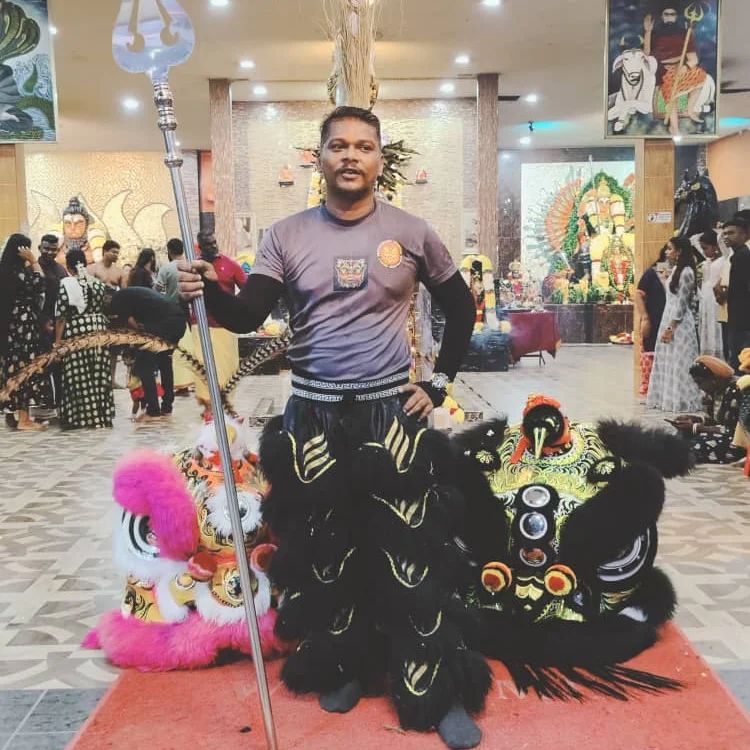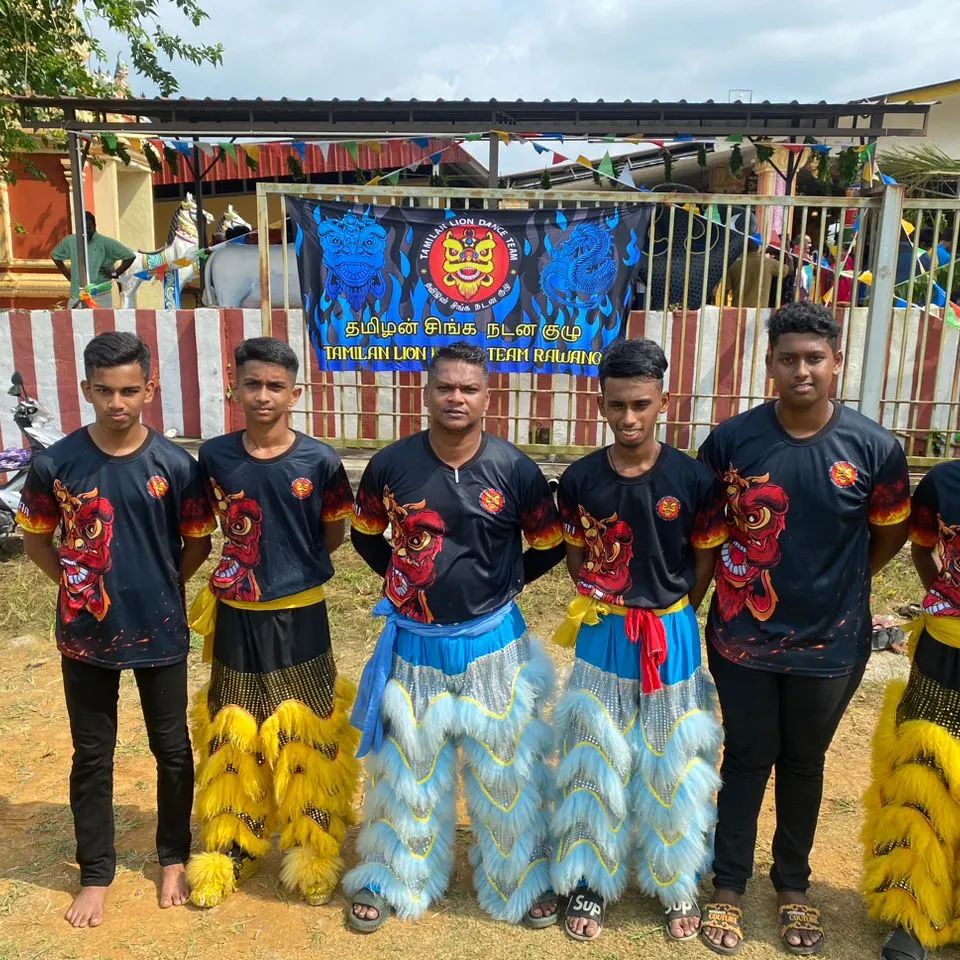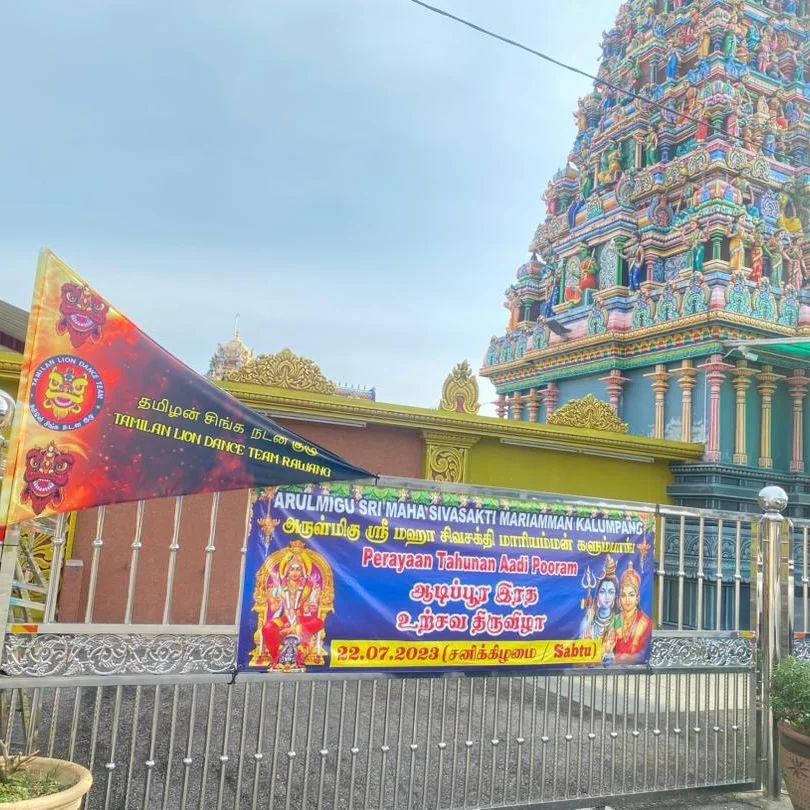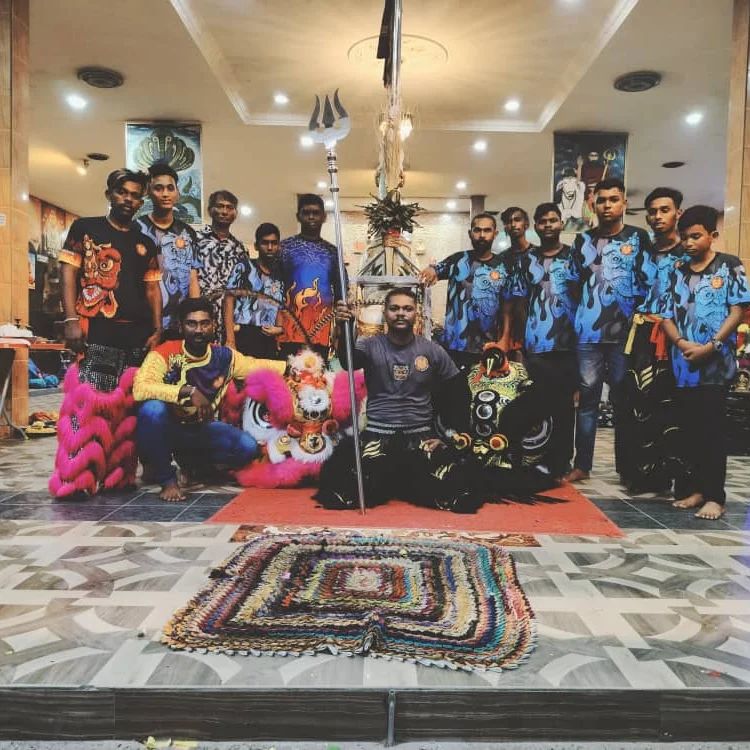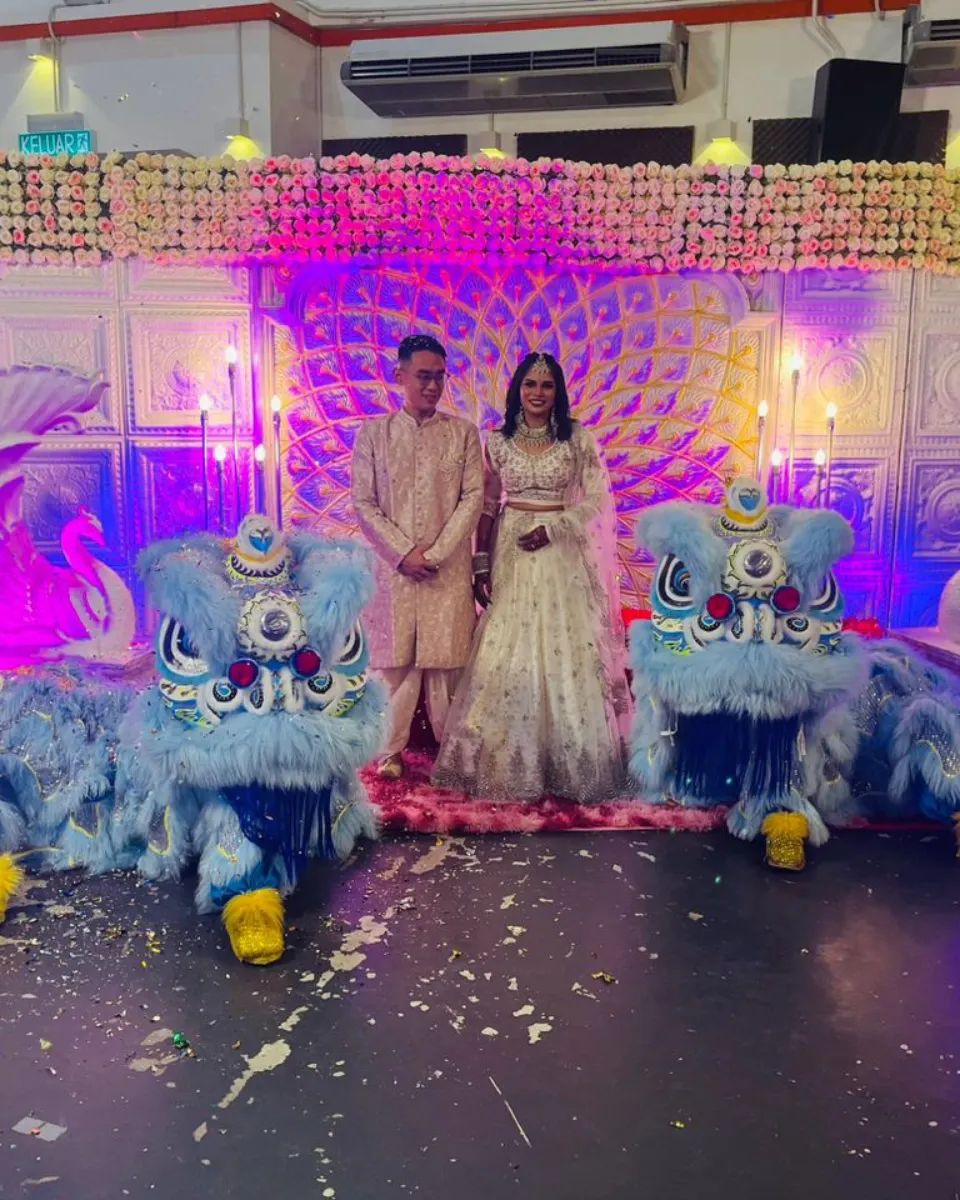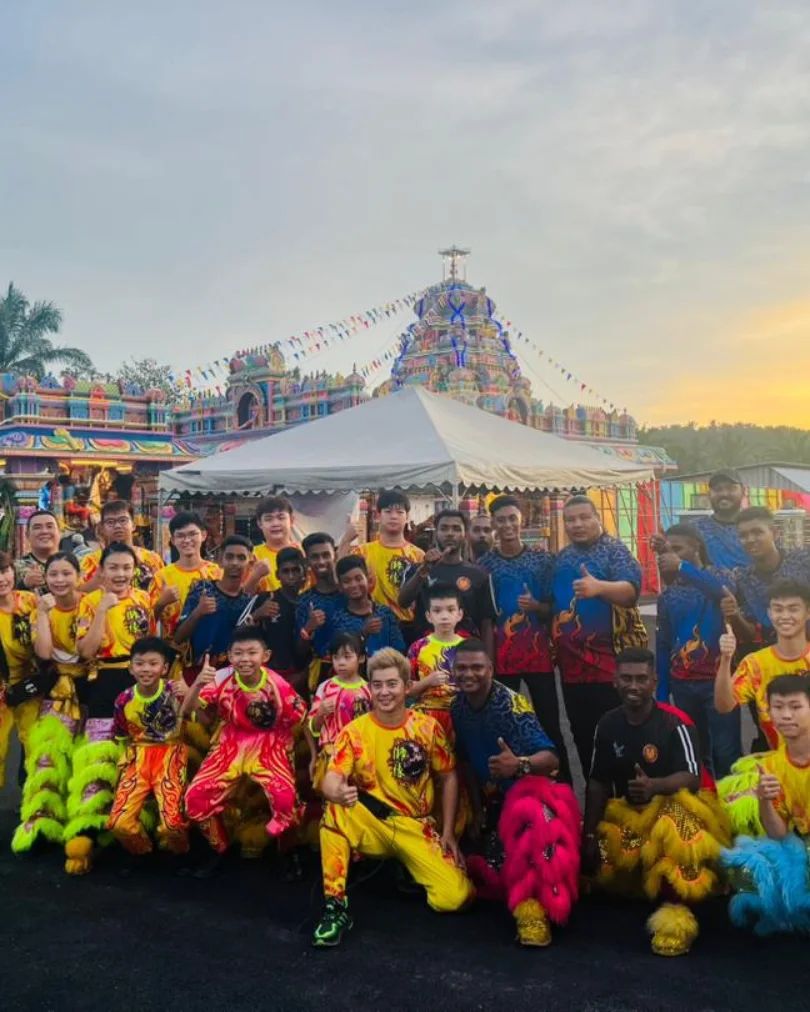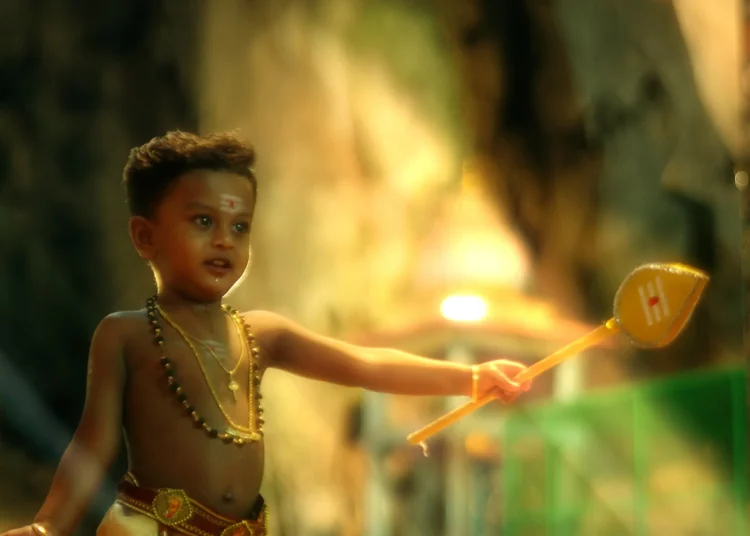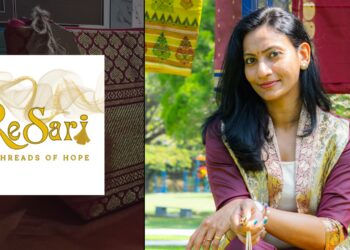In a country such as Malaysia, where there are multiplicities of cultures, traditions, religions, and languages, there is bound to be a transcending nature among the people. Tamilan Lion Dance Tai Yen from Rawang, which has been operating for four years now, is one such group that transcends the boundaries of culture to create their own unique, defiant, and creative path in what Tamil culture and Chinese art form are. In this feature, the founder of the group, Achibabu Subramaniam, expresses how lion dancing has become an intrinsic element of his soul, how he learned the art through his adoptive Chinese father, and how the group has managed to not only honour and abide by the roots of the Chinese Lion Dance but also respectfully create their own new traditions through that artform.
Achibabu’s Boyhood & Shifu Ong Yew Kee
Achibabu Subramaniam, born into a working-class Tamil family in Rawang, lost his father at the age of 7. Upon the death of his father, the young Tamil boy was taken in by Shifu Ong Yew Kee, a local lion dance master and founder of Tai Yen Lion Dance. Shifu Ong, who himself was married to a Tamil woman, had not only raised Achibabu as his son but also as his disciple, training the young boy in the art of lion dancing. Since the age of 8, Achibabu has been enraptured and entranced by this art. He expressed how lion dance has become part of his being since he started learning it. The artform had collided with his identity, becoming connected and cemented to who he was at his core. Apart from Achibabu, Shifu Ong has also trained six other Tamil boys in his lion dance group.
At the age of 25, and only after 7 months of his marriage, Shifu Ong Yew Kee had sadly passed away. Upon his death, the Chinese boys who had been members of Shifu Ong’s lion dance group pushed out the Tamil boys in it and claimed ownership of the group. For the next 10 years after that incident, Achibabu did not pursue lion dancing, but one day his younger sister, Shifu Ong’s own daughter, called him, beckoning him to restart their father’s lion dance group, which had been abandoned by the former Chinese members. After making sure that he could legally take over the team, Achibabu devoted himself completely to breathing new life into his former Shifu’s group.
The Early Days
The newly resurged group, with Achibabu at the helm of it, began performing for free at eight events as a way to get the word out about their team. Achibabu shares with pride and gratitude that he still remembers the first three free events his group was given the opportunity to perform at. The first was a small house temple in Rawang; the second was his good friend’s wife’s birthday party; and the third was at the wake of Rawang Durgai Amman temple’s priest. He said that although they don’t usually perform at funerals, the priest has been an incredible support for their lion dance group, and they felt it was their duty to perform in his last right.
Achibabu’s entry into the field of lion dancing cannot just be credited to his own hard work and the dedication of his team, but also to the Tamil community, which has been a great source of support for this group. Achibabu shares that temples with village deities have always welcomed their performances, allowing them the chance to express their art earnestly. Since their hopeful beginnings four years ago, the Tamilan Lion Dance Team has become a rooted and integral part of Tamil Hindu Thiruvizhas, temple observances, and other Tamil secular functions like birthdays and family celebrations. This is emblematic of how culture is a constantly transmuting and transgressing entity, and that the driving force of cultural change is people’s spirit and creativity.
Respecting Origins & Synchronizing Cultures
According to Shifu Ong’s teaching, Achibabu shares that the history of lion dance began when people were trying to defend themselves from an evil demon. In order to protect themselves, defeat the demonic spirit, and cleanse their land, people would dress up in lion costumes to scare the demon away. While bearing respect for the origins of this ancient Chinese art form, Tamilan Lion Dance Tai Yen forges its own distinct new culture. Today, many Hindu temples and religious festivals have made lion dance performances an inseparable and innate element of their ritual. Achibabu proudly shares that every Tamil function now is incomplete without a lion dance performance to both entertain and bless the occasion.
Achibabu shared how, for his performance in temples, there are specific rituals and ethics that they follow, which are both new to the Chinese lion dance culture and the Tamil Hindu religion. He details that each colour of the lion dance costume is designated for a specific deity. The black lion is for the Tamil Hindu folk god Karuppusamy, while a specific shade of yellow is for the Hindu deity Hanuman. He further added that the colours red and yellow are used to revere other Hindu deities during temple occasions. As lion dancing is a new cultural practice added to Hindu festivities, Achibabu states that during temples as well as in-house performances, they do not wear their shoes as a sign of respect for the holy space. Along with that, Achibabu abstains from consuming meat a night before his temple performance, expressing that when he is in his costume, his body must be pure and devoted to the deity. While traditionally Chinese lion dance performances have the lion offer onlookers the mandarin, in the Tamil version of this performance, the banana is used instead, as that is more culturally tied to Tamil Hindu temple rituals, says Achibabu. The Tamil lion dancers would also offer flowers to the devotees as a sign of blessing. Apart from temples, the lion dance group also performs at weddings, and on that occasion, they usually adorn themselves in their sky blue lion costume to bless the new couple for their marriage.
Achibabu also shares that while most of the performance moves his team uses are the same as those of other Chinese dance groups, the difference between them and Chinese dancers is that in temples, instead of performing the usual 10 minutes, which is how long most Chinese troops perform, Tamilan Lion Dance Tai Yen performs up to 15 minutes. While the instruments also remain the same, sometimes during temple performances they would also perform to, with the permission of the Urumi Melam musicians, traditional Tamil folk instruments like the Tappu, Parai, and Urumi Melam. Achibabu, like any true Tamil, shared how hearing these ancient Tamil instruments, which have been all made from cow hide, always makes his body move to the powerful and possessing music.
Societies Perception & The Future
While seeing a group of Tamils performing lion dancing might be new, the general public has been incredibly welcoming and encouraging to Tamilan Lion Dance Tai Yen, says Achibabu. He shares how the Malays and Chinese have sent them nothing but praise for their dedication towards learning this artform, while a small number of Tamil elders have shown their disdain, many more Tamil people have showered the group with their enthusiasm, with many young Tamils even showing great interest in learning the artform from them. Achibabu also shared how the Chinese suppliers they work with in places like Teluk Intan and Johor that produce their costumes and instruments, give them the same rate as they do for Chinese lion dancing groups, emphasising how there isn’t any form of discrimination that takes place within the industry. He further stated how Chinese lion dancing groups even recommended them to other customers and that the lion dancing community in Malaysia has shown them their outmost fraternity for their efforts.
Currently, the Tamilan Lion Dance Tai Yen has 15 members, all ranging from 10 years old to 43 years old. Achibabu fondly shared how their youngest member, the 10-year boy, is an expert at playing the dong for their performances. As everyone, including Achibabu himself, takes part in their team part-time, they have designated their training period to be on Sundays, where they practice for 3 hours. In efforts to take the team to the next level, Achibabu shares that he will be attempting to gain the Malaysia Book of Records for being the first Tamil Lion Dancing Group in Malaysia in August this year. He will also be opening a second branch called Singa Tamizhan, which will be a mixed group of all ethnicities.
On the whole, Achibabu’s life story is a painful yet hopeful reality of how, through loss, one can find new life. Even at the death of his father, Achibabu had been selflessly raised by Shifu Ong Yew Kee, who only saw Achi as a boy who needed guidance and protection. Through their simple kindness and love, a new tradition has been born that mirrors not just the relationship Achibabu and his Shifu shared but also the devotion Achibabu and many other Tamils like him have for the Chinese lion dance. In memory of his adoptive father and Shifu and in recognising his own new path. Achibabu has renamed the group Tamilan Lion Dance Tai Yen from the former name of Tai Yen Lion Dance Group. In the end, traditions and cultures are forged by the human spirit and action. Art is a grand spectacle that is cultivated by the connection people share with one another, and with the right mind and heart and the determination to see them through, one can pave the way for a new harmonious heritage for the human race.
For booking related inquiries please call Achibabu at 0 18-236 6131
All images are taken from Tamilan Lion Dance Tai Yen Rawang Instagram
Follow us on Instagram, Facebook or Telegram for more updates and breaking news.



